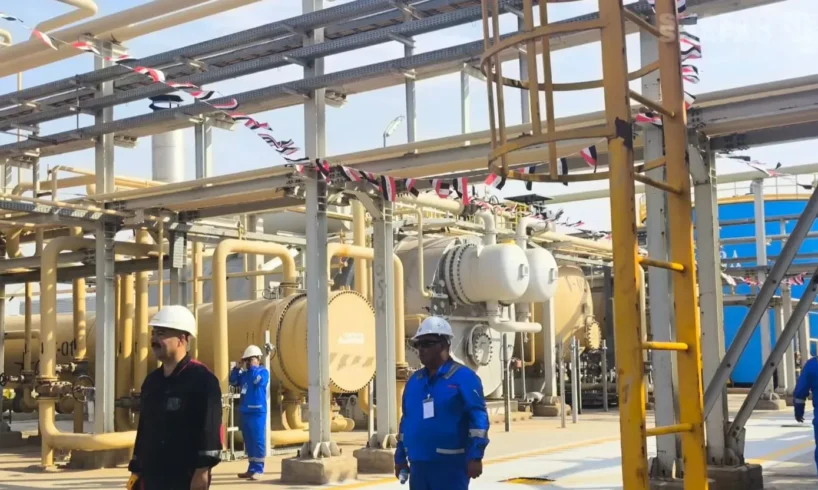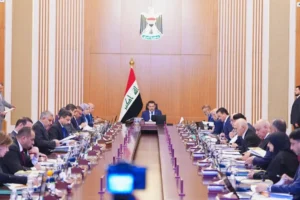
2025-11-02T08:49:18+00:00
font
Enable Reading Mode
A-
A
A+
Shafaq News
After more than two
years of suspension, oil exports from Iraq’s Kurdistan Region through the
Ceyhan pipeline have stabilized at around 190,000 barrels per day (bpd) — a
cautiously optimistic milestone that signals both technical recovery and
political fragility.
Officials expect
output to gradually rise to 225,000 bpd once maintenance and logistical
adjustments are completed, marking a potential turning point for one of Iraq’s
most disputed economic files.
A source at the North
Oil Company in Kirkuk told Shafaq News that the current volume reflects a
“stabilization of operations and improved pumping capacity,” noting that any
increase will depend on completing all technical and logistical maintenance to
ensure uninterrupted flow.
Exports had been
halted since early 2023 amid legal disputes between Baghdad and Erbil over oil
rights, revenue distribution, and control of pipelines. The stoppage, which
followed earlier shutdowns, left facilities underused and companies uncertain
about the future.
The resumption
therefore represents not only a logistical achievement but also a sign of
renewed coordination between the Kurdistan Regional Government (KRG), federal
authorities, and the Turkish pipeline operator — a coordination long absent
from Iraq’s energy scene.
Energy expert Ali
Khalil told Shafaq News that maintaining exports at 190,000 bpd is “an
important step toward reviving the region’s oil sector,” but stressed that “the
real challenge lies in sustaining production and scaling beyond 225,000 bpd.”
He said consistent
output “will strengthen revenues and improve the fiscal balance for both the
region and the Iraqi state.”
For Kurdistan, the
resumption offers a much-needed cash flow to pay public salaries, fund local
projects, and restore investor confidence. For Baghdad, it increases overall
export volumes and eases budgetary strain amid volatile global oil prices.
Despite this
progress, infrastructure remains vulnerable. The pipeline system requires
constant maintenance, and any disruption could once again halt exports. At the
same time, the financial and legal framework between Baghdad and Erbil remains
unsettled. Without a comprehensive revenue-sharing agreement, disputes over oil
ownership, profit allocation, and contract transparency could re-emerge.
Khalil emphasized
that “the challenge is not only in pumping oil, but in ensuring
international-grade logistics, compliance with Iraqi and global regulations,
and timely payments to operating companies.”
Experts also
highlight the need for transparent contracts, routine supervision, and clear
payment systems to prevent friction and sustain investor trust. The KRG’s
credibility in international markets depends largely on honoring commitments
and maintaining consistent operations.
According to Khalil,
the gradual recovery is a positive signal to foreign investors who had grown
wary of the region’s political uncertainty. “Stable exports demonstrate that
Kurdistan can meet technical and contractual obligations despite complex
internal dynamics.”
If sustained, the
rise to 225,000 bpd could enhance the Kurdistan Region’s financial autonomy
within Iraq’s federal framework and strengthen its hand in negotiations with
Baghdad. It would also inject liquidity into the local economy through
salaries, contracts, and development spending.
Yet the memory of
previous interruptions — from legal injunctions to pipeline breakdowns — keeps
investors cautious. Long-term confidence will depend on institutional
stability, not short-term deals.
The renewed exports
signal a tactical détente between Baghdad and Erbil rather than full
reconciliation. Both sides are motivated by fiscal necessity, but core disputes
— especially over constitutional interpretations of oil ownership and the
management of proceeds — remain unresolved.
The coming months
will test whether both governments can maintain operational flow, uphold
transparency, and avoid politicizing the oil file. Success could lay the
groundwork for broader cooperation on energy governance; failure could revive
the mistrust that has long plagued Iraq’s federal system.
The return of
Kurdistan’s oil to global markets marks a cautious re-entry, not a final
victory. The next stage — scaling output, improving quality, and maintaining
transparency — will determine whether this recovery endures.
“This step is meaningful only if supported by
sustained technical, financial, and legal stability. The coming months will
reveal whether the region and the state can turn this momentum into lasting
economic resilience,” Khalil concluded.
Written and edited by Shafaq News staff.





